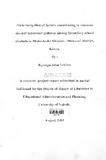| dc.description.abstract | This research was carried out to investigate some of the factors contributing to common
deviant behaviour patterns among secondary school students and the possible ways of
eradicating such behaviour in secondary schools.
The research questions included the followings:-
• What are the main causes of deviant behaviour in various secondary schools?
• What is the attitude of the school community towards deviant behaviour?
• How do teachers and administrators influence deviant behaviour or students III
secondary schools.?
• What is the relationship between the concentrated curriculum in school and deviant
behaviour in schools?
• In what ways do the administrators of schools identify deviants in their secondary
schools?
• What is being done by administrators of secondary schools to eradicate deviant
behaviour in their schools?
• Could the peer group of a child influence the deviant behaviour of a particular child",
The research was carried out in Makueni District in Eastern Province The sample
collected consisted of three schools of the following categories of: A boys' secondary
school, girls' secondary school and a mixed school.
All the schools were boarding. In each school, 50 students , 10 teachers 3 Board of
Governors were selected using stratified sampling procedure.
Data was collected by means of questionnaire and analyzed using descriptive stat istics
where frequency distribution was used and later converted to percentages
The research found that;
1. Teachers and administrators of the school contribute towards deviant behaviour in
their schools
2. Deviant behaviour can be caused by the concentration of the curriculum.
3. Peer groups have a lot of influence to deviant behaviour of the group members
4. The administrators of schools identify deviant behaviour by using the prefects,
secret agents in the school and outside the school, students performance results,
teachers on duty and also through class attendance sheets.
5. The community does .not support any kind of deviant behaviour.
The research recommends that:-
• Teachers should conduct themselves nicely since they are the role models of the
students and they are supposed to be emulated by students This means they
should not smoke in front of their students, come to school drunk or
have sexual relationships with the opposite sex students.
• The ministry of Education should reduce still the number of subjects done by
secondary school students and also reduce the number of topics in some subjects
to a manageable number which cannot give room to any kind of deviant
behaviour.
• The school administrators to collaborate not only with the parents to assist them
identify deviant behaviour of their students but also involve the school
neighbours.
• Parents and teachers should warn students against undesirable associate for they
influence their behaviour.
• The school community should come up with joint efforts of dealing with deviant
behaviour and not just leaving the head teachers and Board of Governors to deal
with the behaviour alone. | en |

